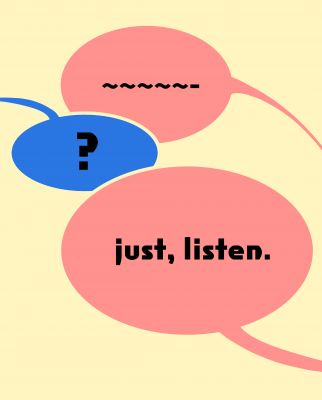Watching the vice presidential debate was relieving in a sense. I could understand what was being said and it didn’t feel as though a kindergarten class was arguing among themselves. It was refreshing to hear an actual debate regarding relevant issues.

I could not tell you what was said on either side in the first presidential debate, so the fact that I am able to retain any of the arguments from the vice presidential debate is a start. Though, there was something else to this debate. As a woman, it was simultaneously anxiety-inducing and empowering.
I was so nervous to watch California Sen. Kamala Harris go up against Vice President Mike Pence. Being a woman in politics, or in any position of power, adds a whole slew of potential insults and arguments to look out for.

I was only in high school when Hillary Clinton ran against President Donald Trump, but I still remember the sexism and misogyny she experienced — both from the president himself in debates and from his loyal supporters elsewhere.
People would talk about how a woman cannot run for office because she is “too emotional,” or cannot be a natural-born leader in the way a man is. Trump had even made fun of her for using the restroom at a debate, which was incredibly bizarre.
I did not want to watch Harris get berated and made fun of for things that have nothing to do with her ability as a future vice president.
While much of the conversation was spent debating the topic at hand, one thing I am sure many women noticed and resonated with was the constant interruptions.
Time Magazine posted an article afterward examining all of the interruptions Harris faced from Pence. It found that he interrupted her twice as often as she interrupted him, and many women on Twitter, including other politicians, wrote they endure this disrespect daily.
The article also highlights three studies conducted over the past few decades that all conclude with an unsurprising fact: men interrupt women more often than they interrupt other men. Many women do not need these studies as proof because they live that experience every day.
It can go beyond seemingly harmless interruptions, though. Just this week, Michigan Gov. Gretchen Whitmer had her life threatened by a domestic terrorist organization with a plot to kidnap her.
Court documents reveal one of the men accused of being involved in the kidnapping plot said, “Snatch and grab, man. Grab the f— in’ Governor. Just grab the b — .”
The men involved were angered over the closures of bars, gyms and other establishments due to the pandemic, and felt that political “tyrants” needed to be stopped. These men were angered at government power and felt those in charge “violated the constitution.”
So, they resorted to kidnapping — how else could they satisfy their deep-seated misogyny?
Suddenly, being a woman in politics isn’t just confronting constant interruptions. Apparently, it’s also facing life-threatening plots to kidnap you.
Watching women be ridiculed over things that should have nothing to do with their ability to be a politician is difficult. And to know it can lead to something as extreme as kidnapping is scary.
But watching women such as Harris and Gretchen stand up against these men is so empowering. When Harris repeatedly asked Pence to not interrupt her and said she was speaking, every woman watching who has been spoken over, cut off or straight-up ignored by their male colleagues collectively felt seen.
Knowing there are women out there facing these situations head-on made me feel as though I can do it, too.
Even if you do not agree with Harris’ policies, the representation feels good. Women can take on any role that men can, especially in politics. If we keep standing up to these interruptions, more men will realize we cannot just be talked over and ignored.
Many of them might not even realize they are doing it, but it is no longer okay to let it slide. Remind them you are speaking and continue your sentence, just as Harris did.
























































































































